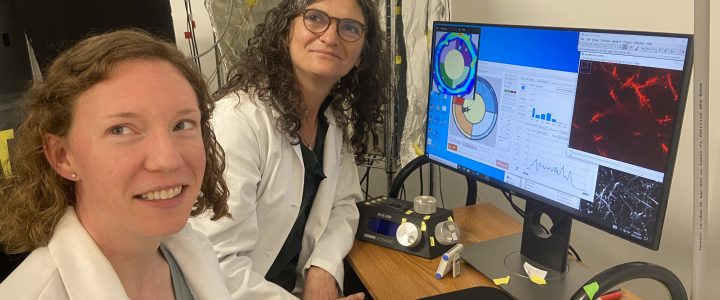Join Dr. Tsai and Dr. Kumar on a journey into novel treatment avenues for Fragile X syndrome. Learn how activating mGluR7 could be a game-changer, opening up uncharted therapeutic territory.
Read more2023 Grants
Pharmacological Modulation of Nicotinic Signaling

Nicotine — familiar to any smoker — tickles nicotinic acetylcholine receptors in the brain. These receptors are key to important brain functions including learning and memory. This team will explore whether drugs that dampen these receptors can improve cognitive function in Fragile X.
Read moreAstrocyte Contribution to Sensory Hypersensitivity in Fragile X Syndrome

Most Fragile X research has focused on one type of brain cells: neurons. But mounting evidence point to problems with astrocytes, star-shaped cells which are vitally important to normal brain function. This team is working to understand how astrocytes are involved in Fragile X and develop treatment approaches that targets astrocytes alone.
Read moreReactivating the FMR1 Gene to Reverse Fragile X Syndrome

FRAXA Research Foundation is dedicated to funding breakthrough research, providing $240,000 to reactivate the FMR1 gene to combat Fragile X Syndrome, with the goal of restoring vital protein function and advancing towards a cure.
Read moreC-subunit Mitochondrial Leak Channel in Fragile X Syndrome

Explore Yale’s groundbreaking study on mitochondrial leak channels, set to revolutionize Fragile X syndrome treatment. Funded by a $100,000 FRAXA grant.
Read moreSomatosensory Processing as a Therapeutic Target for Fragile X Syndrome

Awarded a FRAXA Research grant, Dr. Andrew Stanfield, Dr. Leena E. Williams, and Dr. Damien Wright are set to explore somatosensory processing (sense of touch) in Fragile X syndrome at the University of Edinburgh. Their aim? A noninvasive touch test that could set the stage for future clinical trials in FXS.
Read moreAntisense Oligonucleotides (ASOs) to restore FMRP in Human Fragile X Cerebral Organoids

Explore Dr. Richter’s encouraging results with ASOs for Fragile X syndrome. A $100,000 grant now fuels pivotal studies needed to advance toward ASO therapy.
Read moreSlack Potassium Channel Inhibitors to Normalize FMR1 Knockout Mice

Learn how a $100,000 FRAXA research grant supports Yale researchers in using Slack potassium channel inhibitors to treat Fragile X syndrome by normalizing behaviors in FMR1 knockout mice.
Read moreRoles of Postnatal Transient Connectivity in the Development of Fragile X Syndrome

A $100,000 FRAXA research grant awarded to Gabrielle Pouchelon, PhD, and Dimitri Dumontier, PhD, at Cold Spring Harbor Laboratory fuels groundbreaking research on Fragile X syndrome. Their work focuses on understanding sensory sensitivities and developing a noninvasive screening method, a potential game-changer for families affected by Fragile X syndrome.
Read moreA Tat-Conjugate Approach to Treat Fragile X Syndrome

Explore Turner Lab’s novel approach to developing definitive treatment for Fragile X syndrome with a Tat-conjugated, truncated FMRP protein. This innovative strategy aims to restore brain circuit function and reduce abnormal behaviors linked to Fragile X by directly addressing the cause of Fragile X: a missing protein.
Read moreThe Endocannabinoid System and Fragile X Syndrome

Explore groundbreaking research on the potential of Cannabidiol (CBD) in modulating the endocannabinoid system for Fragile X syndrome therapy. Discover how CBD could change the natural course of Fragile X.
Read moreModeling Fragile X Syndrome using Multi-Region Human Brain Organoids

Discover groundbreaking research at UCI by Dr. Watanabe and Dr. Tsai. Using cutting-edge organoid technology, they’re modeling Fragile X brain function and advancing potential treatment testing.
Read moreSRC Family Kinase Inhibitor as a Potential Treatment for Fragile X Syndrome

Discover the Smith lab’s new approach to treating Fragile X syndrome using Saracatinib, originally a cancer drug. Learn how this $100,000 FRAXA research grant-funded study opens up hopeful avenues.
Read moreUsing Exosomes to Discover Fragile X Biomarkers

How can a blood test give an accurate picture of brain activity? With this grant from FRAXA, Dr. Martire and Dr. Boussadia will try to use unique particles called exosomes – which can travel from brain cells to the blood stream – to evaluate the effects treatments are having on the brain.
Read moreTargeting Cognitive Function in Fragile X Syndrome

It has long been assumed that the differences between males and females with Fragile X were simply a matter of degree, with males being more severely affected. But gender differences may be far reaching. This team is working to understand imbalances in how the brain’s neurons transmit signals, with a focus on how differently males and females learn and experience anxiety. They are studying two neuronal pathways which are promising targets for treatment.
Read moreValidating Novel Inhibitors of ERK Signalling to Treat Fragile X Syndrome

One promising treatment approach for Fragile X syndrome is to inhibit on a neuronal pathway, ERK. ERK inhibitors are also being studied as treatments for other disorders including autism.
This team has conducted pilot studies showing that ERK inhibitors are very effective in reversing signs of disease in Fragile X mice. With this grant from FRAXA they will take the next steps toward possible clinical trials of an ERK inhibitor for individuals who have Fragile X syndrome.
Targeting Serotonin 1a Receptors to Reverse Neurobehavioral Phenotypes
Neurolixis’ new drug targets serotonin 1A receptors, showing promise in preclinical studies for Fragile X syndrome, funded by a FRAXA grant for future clinical trials.
Read moreDevelopmental Motor Phenotype in Fragile X Syndrome

One of the lesser known signs of Fragile X is unsteady walking. This is also very easy to evaluate in the clinic: no blood tests are required! With a $100,000 grant from FRAXA Research Foundation, this team will develop objective new outcome measures of gait for future treatment trials and also to see if exercise could improve other symptoms of Fragile X.
Read moreVersatile Drug Screening Platform for Fragile X Syndrome

Many experts believe that combinations of drugs may be needed to best treat Fragile X syndrome. How can we find the best combinations in the ideal doses? This project — a collaboration between a top university research team and an innovative AI startup both based in Belgium — tackles this challenge.
Read moreFunctional and Genomic Characterization of Interneurons in the Fmr1-KO Mouse Brain

The brain’s balance is maintained by two types of neurons: those that excite and those that inhibit activity. Like yin and yang, this balance is essential. This team has found fewer than normal inhibitory cells in the brains of Fragile X mice. They are now working to pinpoint this abnormality and find ways to restore the normal balance and function.
Read moreRepurposing FDA-Approved Drugs to Treat Major Depressive Disorder in Fragile X Syndrome

Did you know that depression is more common in those with autism and/or Fragile X? Even more disturbing is the discovery that current treatments for depression do not work in Fragile X mice. With this grant, the team will work to develop a rapid screening tool to identify FDA-approved drugs which can treat depression in people with Fragile X syndrome.
Read moremRNA Therapy for Fragile X Syndrome

Dr. Kathryn Whitehead, Associate Professor at Carnegie Mellon University, helped develop the revolutionary science behind the COVID-19 vaccines. With a $103,000 grant from FRAXA, her team will now adapt this technology to deliver the missing Fragile X protein, to treat people who have Fragile X syndrome.
Read moreCharacterization of a Novel CYFIP1 – Derived Peptidomimetic Restoring the Dysregulated mRNAs Translation: Toward An Innovative Therapeutic Strategy for FXS

The researchers are developing next-generation drugs called peptidomimetics, using the functional features of FMRP. If they succeed, the hope is that we will have new drugs that could make up for the loss of FMRP, thus treating Fragile X syndrome.
Read moreCannabinoids as a Treatment for Fragile X Syndrome

Many people with Fragile X syndrome are hyper-sensitive to sights and sounds, and Electroencephalography (EEG) studies show that there are abnormalities in brain circuits. EEG studies show similar changes in Fragile X mice. So the team will use EEG tests in mice to find which drugs best reduce hypersensitivity. They can then easily move on to human EEG-based clinical trials. What they learn will tell us much more about why people with Fragile X are hypersensitive – and which drugs could best help them.
Read moreInhibiting Nonsense – Mediated mRNA Decay: A Potential Treatment Approach for Fragile X

All cells have a kind of housecleaning service which sweeps away genetic errors. This is called nonsense-mediated mRNA decay (NMD). With a previous FRAXA grant, this team discovered runaway NMD in cells of Fragile X patients. It’s not yet known how this impacts people with Fragile X. With this grant, Dr. Maquat and Dr. Kurosaki will test drugs which can bring NMD back to normal levels.
Read more
